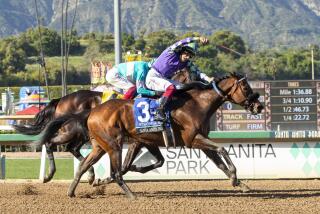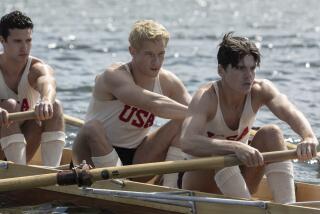In Sailing, Just Skip the Allegiance
- Share via
Skippers ‘R’ Us
Rent ‘em, lease ‘em, and you’ve got ‘em.
America’s Cup Class racing is about as nationalistic as a double agent. It knows no country, or at least any allegiance to any particular country.
In the World Championship semifinals Friday, you could not tell the boat by its skipper’s birth certificate. Dennis Conner and Stars & Stripes might not have been represented, but the U.S.A. certainly was. It might have been a star-spangled splash, except all of the countries involved recognize the Fourth of July as the fourth of July.
Yet three out of the four boats had an American skipper.
Il Moro di Venezia 1 was skippered by an American.
Il Moro di Venezia 15 was skippered by an American.
New Zealand was skippered by an American.
Japan, which probably could have bought any American it wanted, opted for a Kiwi instead.
There you have it--four entries, none skippered by a native son.
To put this in domestic terms, it would be like having baseball’s league championship series and having Roger Clemens pitching for Oakland, Tony Gwynn playing for Baltimore, Orel Hershiser pitching for Philadelphia and Robin Yount playing for the Padres.
The next thing you know, Joe Montana would be the Cleveland Brown quarterback.
Indeed, Mexico almost had an entire crew Friday. Having a serious problem with a gadget I couldn’t begin to describe, the Kiwis went off on a tack that seemed headed for Rosarito Beach.
Rod Davis, the skipper who has both U.S. and New Zealand citizenship, laughed (later) about something Sir Michael Fay had to say.
“If they keep going to Mexico,” Fay said, “they’re going to live in Mexico.”
No problem. That’s the way it is with these sailors, anyway. It’s nothing new, is it? Chris Columbus, after all, was an Italian who sailed for Spain in what was probably called the Caribbean Cup.
And then again, it is new to America’s Cup racing. In the past, there has been very little border- (or ocean-) hopping in Cup racing.
Chris Dickson, the shaggy-haired blond skipper of the Japanese entry, suspects the growth of the event has caused this phenomenon.
“America’s Cup,” he said, sounding very Kiwi, “has grown from being just another yacht race. Ten years ago, people outside the yachting community didn’t know about America’s Cup. People outside know about it now. It reaches a much wider audience. It has far more appeal. It’s an international sporting event.”
America’s Cup, while itself a rather nondescript mug, also has grown to have tremendous value to the country or community that possesses it. It is for this reason that countries like Japan are in this competition for the first time. It is for this reason that Italy is spending more money than it would take to rebuild the Colosseum.
And it is for that reason that the best skippers have grown to be such precious commodities.
The skipper of Italy’s Il Moro di Venezia, for example, is Paul Cayard, a member of the San Diego, St. Francis (San Francisco) and Compagnia della Vela (Guess Where) yacht clubs.
“The level of competition is so high now,” Cayard said, “that you’ve got everyone pushing to the max the rules allow. You have to go get the best sailors.”
The rule is that a crewman has to be a resident of his boat’s country for two years. Cayard moved to Italy in 1988. Dickson moved to Japan at about the same time. Davis is married to a Kiwi and lives in New Zealand. John Kolius, the American who skippered Italy’s second boat Friday, has not met the two-year requirement, but can skipper in this event because it is not the real America’s Cup.
(This two-year residency requirement probably would keep Joe Montana from playing with the Browns, if for no other reason.)
Obviously, the New World is a little ahead of the Old when it comes to sailors.
“America probably has five of the top 10 sailors,” Cayard said, “and three or four of the others are probably from New Zealand. Getting them all involved makes for better competition.”
And Dickson said it isn’t limited to only skippers.
“There’s a lot of cross-pollination,” he said. “Masts. Sails. Winches. Sailors. Shore teams. Sponsors. You’ll probably see a New Zealand boat with American sponsors and an American boat with Japanese sponsors.”
So that’s what it is called.
Cross-pollination.
These chaps would have been called hired guns in the wild west or mercenaries in any of a number of civil conflicts. Baseball calls them free agents.
None of them are for sale, really.
Just for rent.
More to Read
Go beyond the scoreboard
Get the latest on L.A.'s teams in the daily Sports Report newsletter.
You may occasionally receive promotional content from the Los Angeles Times.










